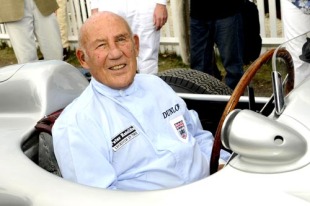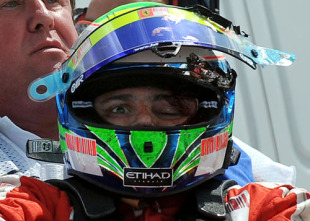- Sir Stirling Moss on the danger of F1 then and now
Motorsport without danger is like cooking without salt
Sir Stirling Moss December 10, 2009
- Drivers:
- Felipe Massa
- |
- Stirling Moss
In this world competition is seen as harmful and people seem to be more and more wrapped up in cotton wool. In contrast Sir Stirling Moss' life in F1 was when it was probably the most dangerous sport in the world. Claire Furnell met up with him at his London home to talk about just how much things have changed.
"One of the reasons I went into racing was because it was dangerous," he said. "That's what teenagers do. Someone says they are a racing driver and people say 'Wow that must be dangerous'. If it hadn't been dangerous, it wouldn't have been nearly as attractive to me - it is an important part of racing, like salt is to cooking.
"These days I can't think of anything safer than a Formula One car if you have an accident. Some years ago we had Alain Prost and Ayrton Senna touching wheels, and meaning to, at 180mph. The safety of today's car certainly does affect the quality of racing. Twenty years after I retired from F1, I had a few outings in touring cars driving an Audi. If my car did not come home with a dent on every corner, I wasn't going fast enough."
Having suffered a serious head injury himself, which led to his retirement, Moss was keen to talk about the freak accident suffered by Felipe Massa earlier this year.
"It will be interesting to see how he performs on his return after his terrible accident. Today's helmet technology is amazing when compared to a helmet from the 1950s and 60s when they were basically a slightly modified polo helmet.
"After an accident they say it's best to get back in the car as soon as you can. Of course when I had my big accident at Goodwood in 1962, I couldn't get back straight away - I was unconscious for a month and paralysed for six. Although I had the same ability as before, whereas before I could drive automatically and without thinking, after the accident I had to concentrate and think about what I was doing; that's why I was forced to retire. I really hope it won't be the same for Massa, but if he finds he has to think about it, he will find it difficult."

Of course with danger often comes disaster; Moss is more than aware he is one of the lucky ones of his generation. He survived in the days before Armco and run-off areas.
"Unfortunately, we lost three or four really good drivers every year - that was the downside of our sport - but you had to have confidence in your own ability. Don't get me wrong, death was not the aim. The biggest problem in my day was the lack of strength in the cars: they would break because the materials were not up to the job. It's not a huge surprise as we would take production parts and modify them to use on a racing car. Nowadays every part is purpose made for a specific function.
"Getting into an old Formula One car you knew you were really vulnerable. To use a straightforward analogy, if a tightrope was only one foot above the ground anyone would try it, if its 50 feet in the air not many would and without a safety net even fewer. That was the appeal of racing to me."
Most people think that the safety measures introduced to F1 since he retired must have improved the sport, but Moss has his own take on the situation.
"I know when drivers of today get into a car like mine they say 'you must have been mad, it's really unsafe - crazy'. Jackie Stewart did a lot towards making racing safer. Today we have huge run-off areas for example. To me, at some circuits, this rather emasculates the sport."
Moss, like many, was shocked to hear accounts of the "Crashgate" saga, but he firmly believes the demise of the sporting nature of F1 stems back much further.
"The way Flavio Briatore and his team behaved in Singapore, which "allegedly" led to Piquet crashing his car, was appalling. It is no longer a sport - in the way that horse racing isn't a sport. In my mind when we allowed adverts on cars it was a backwards step in racing. Once you get advertisers it means there is big money coming in, that is likely to remove the sporting element. It is an interesting and sometimes exciting business. There is, however, virtually nothing sporting about it at all."
For Moss, his racing days must often seem a long time ago - this year he turned 80 - while many at his age would be content with a pipe and slippers he shows no sign of slowing down and can still be found racing in selected historic events in what he calls "the sort of cars I really love".
He is never backwards in coming forwards, but after over 60 years in the sport he has earned the right to his opinions. If there is anything you would like Moss to talk about, why not let us know - you may not always like his opinions but we hope it will get you talking.
http://www.stirlingmoss.com/
Read Sir Stirling Moss' unique view on the world of F1 past and present every month only on ESPNF1
© ESPN Sports Media Ltd.
 Sir Stirling Moss OBE - a British motor racing legend, recognised as one of the world's greatest racing drivers. He won an astonishing 212 of the 529 races he entered during his 15-year career, competing in just about every class of motor racing, including 16 Formula One races. His victory in the 1961 Monaco Grand Prix is one of the most famous races in F1 history. Stirling's vast experience comes from being a racer and from knowing those who compete in and run the sport now. He never shies away from commenting on all aspects of the sport he loves. Gallery of his career
Sir Stirling Moss OBE - a British motor racing legend, recognised as one of the world's greatest racing drivers. He won an astonishing 212 of the 529 races he entered during his 15-year career, competing in just about every class of motor racing, including 16 Formula One races. His victory in the 1961 Monaco Grand Prix is one of the most famous races in F1 history. Stirling's vast experience comes from being a racer and from knowing those who compete in and run the sport now. He never shies away from commenting on all aspects of the sport he loves. Gallery of his career

